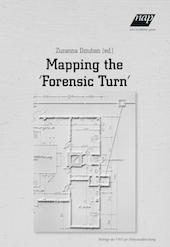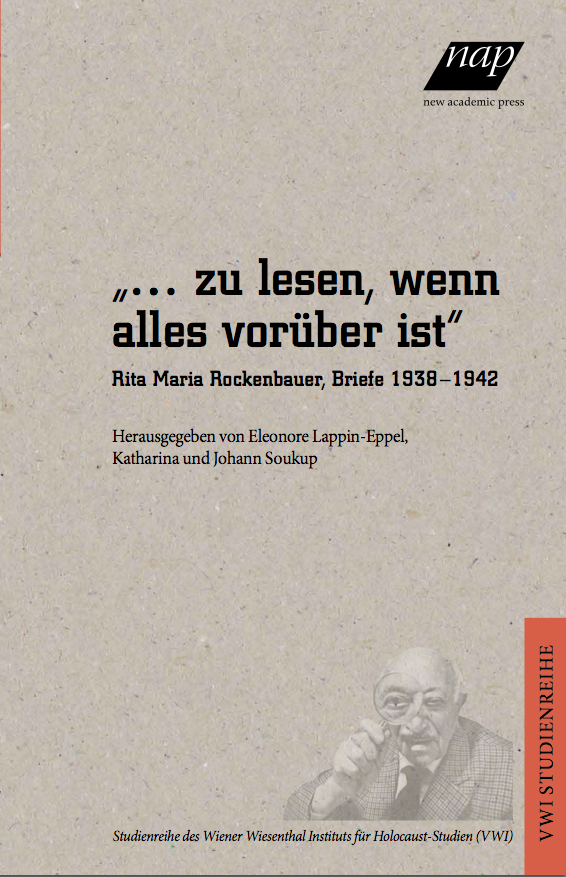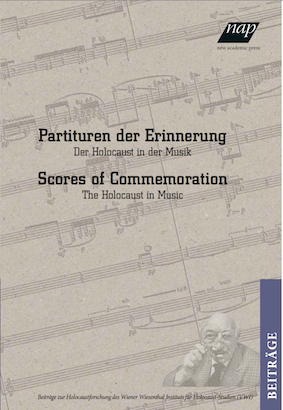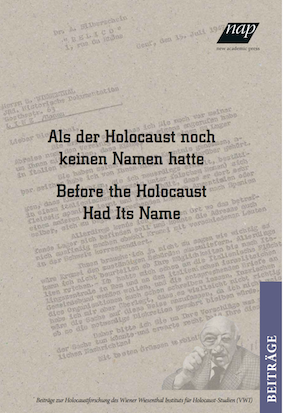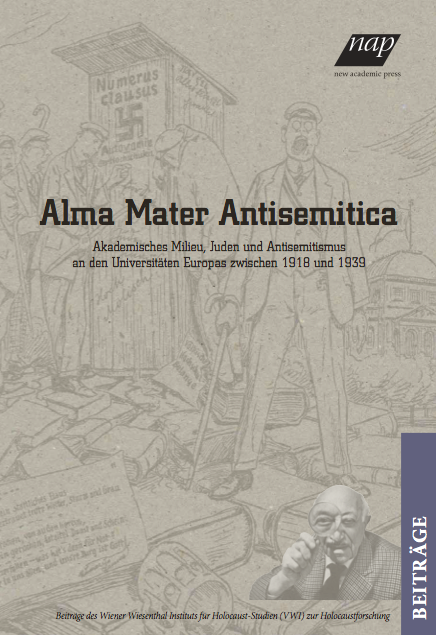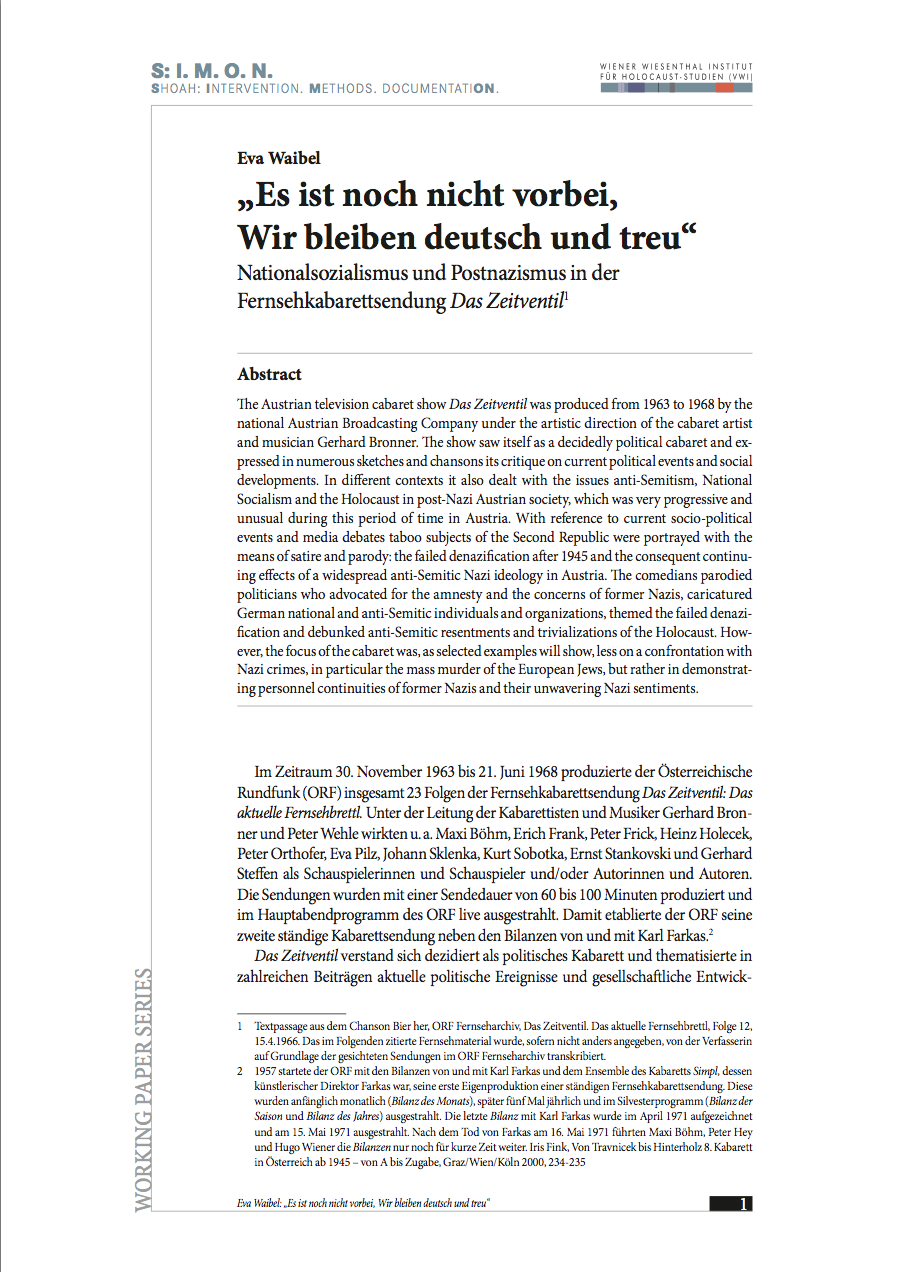 The Austrian television cabaret show Das Zeitventil was produced from 1963 to 1968 by the national Austrian Broadcasting Company under the artistic direction of the cabaret artist and musician Gerhard Bronner. The show saw itself as a decidedly political cabaret and expressed in numerous sketches and chansons its critique on current political events and social developments. In different contexts it also dealt with the issues antisemitism, National Socialism and the Holocaust in post-Nazi Austrian society, which was very progressive and unusual during this period of time in Austria. With reference to current socio-political events and media debates taboo subjects of the Second Republic were portrayed with the means of satire and parody: the failed denazification after 1945 and the consequent continuing effects of a widespread antisemitic Nazi ideology in Austria. The comedians parodied politicians who advocated for the amnesty and the concerns of former Nazis, caricatured German national and antisemitic individuals and organizations, themed the failed denazification and debunked antisemitic resentments and trivialisations of the Holocaust. However, the focus of the cabaret was, as selected examples will show, less on a confrontation with Nazi crimes, in particular the mass murder of the European Jews, but rather in demonstrating personnel continuities of former Nazis and their unwavering Nazi sentiments.
The Austrian television cabaret show Das Zeitventil was produced from 1963 to 1968 by the national Austrian Broadcasting Company under the artistic direction of the cabaret artist and musician Gerhard Bronner. The show saw itself as a decidedly political cabaret and expressed in numerous sketches and chansons its critique on current political events and social developments. In different contexts it also dealt with the issues antisemitism, National Socialism and the Holocaust in post-Nazi Austrian society, which was very progressive and unusual during this period of time in Austria. With reference to current socio-political events and media debates taboo subjects of the Second Republic were portrayed with the means of satire and parody: the failed denazification after 1945 and the consequent continuing effects of a widespread antisemitic Nazi ideology in Austria. The comedians parodied politicians who advocated for the amnesty and the concerns of former Nazis, caricatured German national and antisemitic individuals and organizations, themed the failed denazification and debunked antisemitic resentments and trivialisations of the Holocaust. However, the focus of the cabaret was, as selected examples will show, less on a confrontation with Nazi crimes, in particular the mass murder of the European Jews, but rather in demonstrating personnel continuities of former Nazis and their unwavering Nazi sentiments.
Editorial
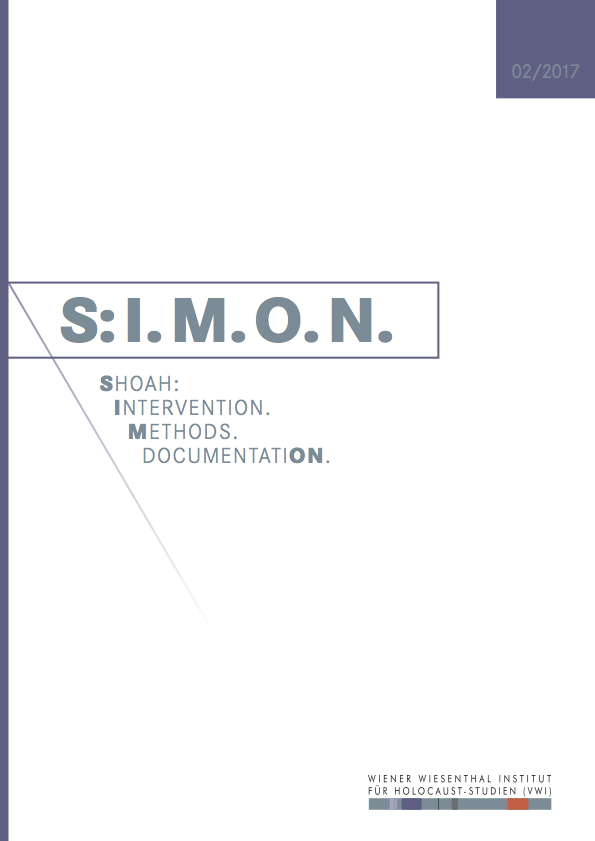 S:I.M.O.N. is an e-journal of the Vienna Wiesenthal Institute for Holocaust Studies (VWI). It appears twice a year in English and German language. S:I.M.O.N. aims at both a transnational and comparative history of the Holocaust and Jewish Studies in Central and Eastern Europe within the broader contexts of the European history of the 20th and 21st century, including its prehistory, consequences and legacies as well as the history of memory.
S:I.M.O.N. is an e-journal of the Vienna Wiesenthal Institute for Holocaust Studies (VWI). It appears twice a year in English and German language. S:I.M.O.N. aims at both a transnational and comparative history of the Holocaust and Jewish Studies in Central and Eastern Europe within the broader contexts of the European history of the 20th and 21st century, including its prehistory, consequences and legacies as well as the history of memory.
S:I.M.O.N. serves as a forum for discussion of various methodological approaches. The journal especially wishes to strengthen the exchange between researchers from different scientific communities and to integrate both the Jewish history and the history of the Holocaust into the different “national” narratives. It also lays a special emphasis on memory studies and the analysis of politics of memory. S:I.M.O.N. uses a double-blind review system, which means that both the reviewer’s and the author’s identities are concealed from each other hroughout the review process.
Shoah: The journal deals with the history of the Shoah from multidisciplinary, transnational and comparative perspectives. It seeks to integrate studies on Jews as well as on other groups of victims of the Holocaust, especially on Roma, and of so far less researched regions of (East) Central and (South) Eastern Europe.
Intervention. The journal reports on research projects and their transmission into public events. It also informs about current educational and remembrance programs.
Methods. The journal serves as a forum for the discussion of methodological approaches as, for instance, the everyday history, oral history, gender history, the history of violence, anti-Semitism and racism and the theory of memory and memory politics.
DocumentatiON. The journal contributes to critical approaches on using and interpreting archival materials in the 21st century.
Download the current issue S:I.M.O.N. 2017/2.
Articles
Sławomir Kapralski
The Genocide of Roma and Sinti and Their Political Movement from the Perspective of Social Trauma Theory
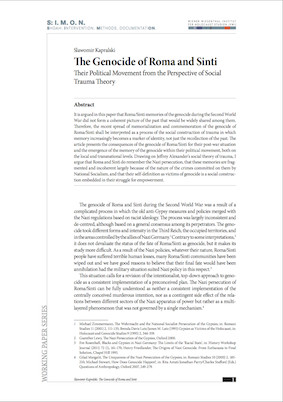 It is argued in this paper that Roma and Sinti memories of the genocide during the Second World War did not form a coherent picture of the past that would be widely shared among them. Therefore, the recent spread of memorialization and commemoration of the genocide of Roma and Sinti shall be interpreted as a process of the social construction of trauma in which memory increasingly becomes a marker of identity, not just the recollection of the past. The article presents the consequences of the genocide of Roma and Sinti for their post-war situation and the emergence of the memory of the genocide within their political movement, both on the local and transnational levels. Drawing on Jeffrey Alexander’s social theory of trauma, I argue that Roma and Sinti do remember the Nazi persecution, that these memories are fragmented and incoherent largely because of the nature of the crimes committed on them by National Socialism, and that their self-definition as victims of genocide is a social construction embedded in their struggle for empowerment.
It is argued in this paper that Roma and Sinti memories of the genocide during the Second World War did not form a coherent picture of the past that would be widely shared among them. Therefore, the recent spread of memorialization and commemoration of the genocide of Roma and Sinti shall be interpreted as a process of the social construction of trauma in which memory increasingly becomes a marker of identity, not just the recollection of the past. The article presents the consequences of the genocide of Roma and Sinti for their post-war situation and the emergence of the memory of the genocide within their political movement, both on the local and transnational levels. Drawing on Jeffrey Alexander’s social theory of trauma, I argue that Roma and Sinti do remember the Nazi persecution, that these memories are fragmented and incoherent largely because of the nature of the crimes committed on them by National Socialism, and that their self-definition as victims of genocide is a social construction embedded in their struggle for empowerment.
SWL-Reader
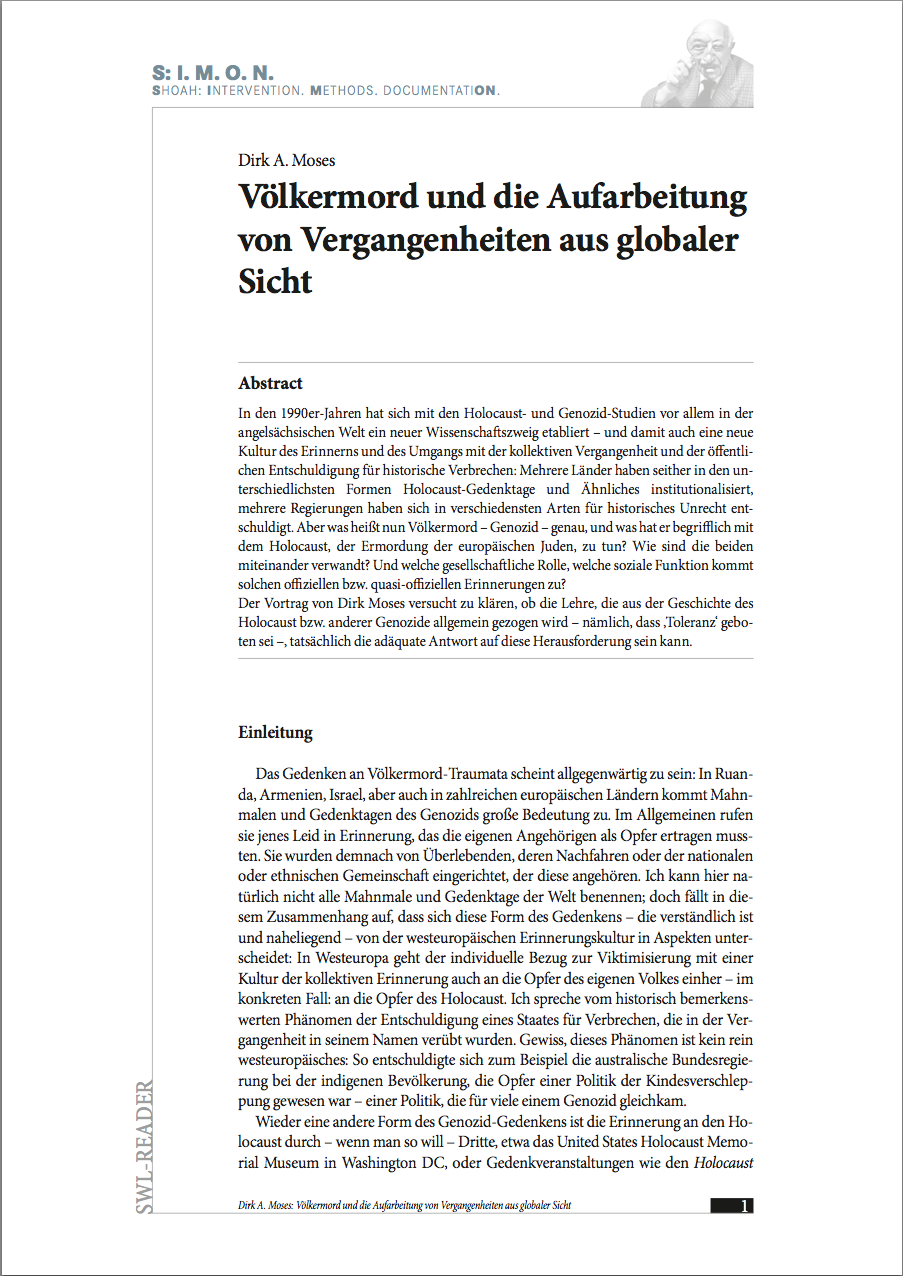 Holocaust and Genocide Studies emerged as a new discipline during the 1990s, particularly so in the Anglo-Saxon world. This development also established a new culture of remembrance and treatment of the collective past and public apologies for historical crimes. Since then, several countries have institutionalized Holocaust memorial days and similar institutions in a range of formats, several governments have apologized for historical injustices in various manners. Yet, there remains the question of a precise definition of a genocide – and in what way the term is connected to the Holocaust, the murder of the European Jews. How are these two related? What is the social function of such official or semi-official remembrances, and what is their role in society?
Holocaust and Genocide Studies emerged as a new discipline during the 1990s, particularly so in the Anglo-Saxon world. This development also established a new culture of remembrance and treatment of the collective past and public apologies for historical crimes. Since then, several countries have institutionalized Holocaust memorial days and similar institutions in a range of formats, several governments have apologized for historical injustices in various manners. Yet, there remains the question of a precise definition of a genocide – and in what way the term is connected to the Holocaust, the murder of the European Jews. How are these two related? What is the social function of such official or semi-official remembrances, and what is their role in society?
In his lecture, Dirk Moses endeavoured to clarify whether the insights gained from the history of the Holocaust and other genocides in general – namely, the imperative of 'tolerance' – really does provide an adequate answer to this challenge.
Events
Miloslav Szabó
Ein ‚antislowakischer' Oscar-Film? Zur Darstellung des Holocaust im tschechoslowakischen Film Obchod na korze
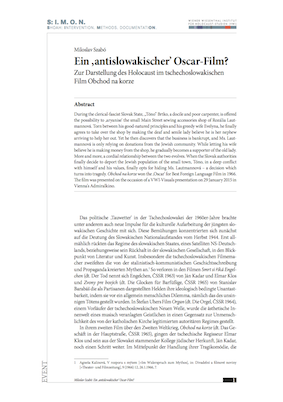 During the clerical-fascist Slovak State, "Tóno" Brtko, a docile and poor carpenter, is offered the possibility to 'aryanise' the small Main Street sewing accessories shop of Rozália Lautmannová. Torn between his good-natured principles and his greedy wife Evelyna, he finally agrees to take over the shop by making the deaf and senile lady believe he is her nephew arriving to help her out. Yet he then discovers that the business is bankrupt, and Ms. Lautmannová is only relying on donations from the Jewish community. While letting his wife believe he is making money from the shop, he gradually becomes a supporter of the old lady. More and more, a cordial relationship between the two evolves. When the Slovak authorities finally decide to deport the Jewish population of the small town, Tóno, in a deep conflict with himself and his values, finally opts for hiding Ms. Lautmannová – a decision which turns into tragedy. Obchod na korze won the 'Oscar' for Best Foreign Language Film in 1966. The film was presented on the occasion of a VWI-Visuals presentation on 29 January 2015 in Vienna's Admiralkino.
During the clerical-fascist Slovak State, "Tóno" Brtko, a docile and poor carpenter, is offered the possibility to 'aryanise' the small Main Street sewing accessories shop of Rozália Lautmannová. Torn between his good-natured principles and his greedy wife Evelyna, he finally agrees to take over the shop by making the deaf and senile lady believe he is her nephew arriving to help her out. Yet he then discovers that the business is bankrupt, and Ms. Lautmannová is only relying on donations from the Jewish community. While letting his wife believe he is making money from the shop, he gradually becomes a supporter of the old lady. More and more, a cordial relationship between the two evolves. When the Slovak authorities finally decide to deport the Jewish population of the small town, Tóno, in a deep conflict with himself and his values, finally opts for hiding Ms. Lautmannová – a decision which turns into tragedy. Obchod na korze won the 'Oscar' for Best Foreign Language Film in 1966. The film was presented on the occasion of a VWI-Visuals presentation on 29 January 2015 in Vienna's Admiralkino.
Eva Waibel: „Es ist noch nicht vorbei, wir bleiben deutsch und treu“. Nationalsozialismus und Postnazismus in der Fernsehkabarettsendung 'Das Zeitventil'
„... zu lesen, wenn alles vorüber ist“
Rita Maria Rockenbauer, Briefe 1938 –1942
Wien 2014
Partituren der Erinnerung.
Der Holocaust in der Musik
Scores of Commemoration.
The Holocaust in Music
Wien 2015
Before the Holocaust Had Its Name. Early Confrontations of the Nazi Mass Murder of the Jews
Wien 2016
Akademisches Milieu, Juden und Antisemitismus an den Universitäten Europas zwischen 1918 und 1939
Academic Milieu, Jews and Antisemitism at European Universities between 1918 and 1939
Wien 2016


